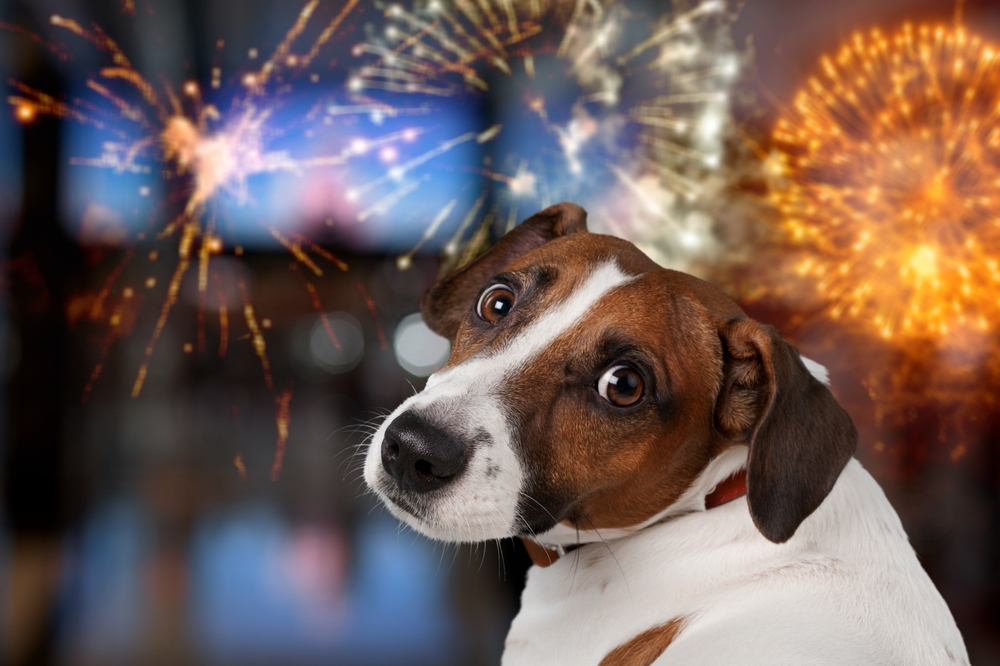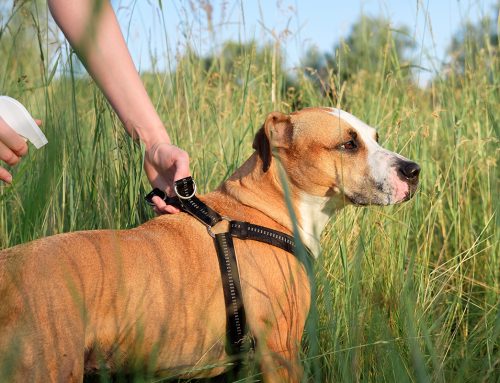July Fourth is a time for celebratory gatherings, but this festive holiday can be stressful and dangerous for pets. Some pets will panic when they hear loud noises, and others will run away or be harmed during noisy gatherings and parties. Our Aloha Veterinary Hospital team shares comprehensive tips to help your furry pal stay safe and calm during the July Fourth chaos.
1. Prepare a safe pet space
Before the festivities, set up a quiet, comfortable space where your pet can retreat from noise or a crowded home. This safe space should be insulated from the outdoors and include your furry pal’s familiar bedding, toys, chews, or comfort items. You may also consider blackout curtains to block light flashes and calming music or white noise to drown out the fireworks. Classical music or specialty pet relaxation tracks are excellent music choices.
2. Identify and address pet noise aversion
Around two-thirds of dogs and the occasional cat suffer from noise phobia, an intense, often irrational fear triggered by sudden or loud noises. Many pets fear fireworks and can be anxious and on edge for hours to days after a noisy event.
Addressing noise aversion takes time, but you should start by speaking with our team about your concerns. Other strategies include:
- Desensitization and counterconditioning — Play fireworks recordings at low volume and gradually increase the intensity while you offer treats for positive reinforcement.
- Anxiety wraps — An anxiety wrap essentially swaddles your pet and can help them feel less anxious.
- Calming Pheromones and Calming Treats– Melatonin, L- Theanine, Camomille, etc.
- Anti-anxiety medications — Many noise-phobic pets require prescription anti-anxiety medications.
3. Keep pets indoors during festivities
Ensure doors, windows, and gates are secured to prevent panicked pets from running away and becoming lost or injured—the number of lost pets increases around July Fourth.
Additionally, always ensure your pet wears a collar with an up-to-date ID tag and is microchipped with current information in the database, which will help reunite you with a lost pet.
4. Beware of pet-hazardous holiday foods
Holiday gatherings often involve BBQs and parties with foods that can harm pets. Keep toxic and dangerous ingredients, including chocolate, alcohol, onions, grapes, corn cobs, animal bones, and fatty foods, out of your furry pal’s reach, and ensure guests know not to feed pets without permission.
5. Help pets work off nervous energy
If you know a noisy or stressful event is going to take place, take your pet for a long walk or play vigorously so they will work off nervous energy. This will help manage their anxiety and can improve how medication and calming products help your pet relax.
6. Distract pets with favorite activities
Keep your pet engaged and distracted from stressful events, including the noise and commotion of fireworks, with interactive toys or food puzzles. Prepare special, frozen, long-lasting treats, such as a stuffed Kong toy, ahead of time to keep them busy and distracted.
7. Keep pets out of fireworks zones
Taking your pet to a fireworks show typically backfires, whether or not they have shown previous fireworks fear. If your pet enjoys community social events, look for pet-friendly gatherings and avoid fireworks at all costs. If your pet’s fireworks phobia is severe and you know you cannot avoid the noise, consider boarding your pet or asking a trusted friend or family member in a quiet zone to keep them.
8. Care for pets after the holiday

Check your yard for fireworks debris or other hazards before allowing your pet outside after a local celebration, house party, or family gathering. Additionally, monitor your pet’s behavior for several days after the event for signs of prolonged stress or anxiety, such as changes in appetite or unusual destructive behavior. If problems persist, consult our team.
July Fourth can be challenging for pets, but you can plan carefully and keep your furry pal safe and secure. If your pet has a noise aversion history, or you suspect they will be afraid of the fireworks, take action now. Contact the Aloha Veterinary Hospital team to develop a treatment plan for your furry pal’s noise phobia.







Leave A Comment